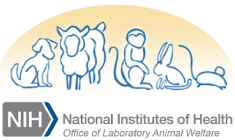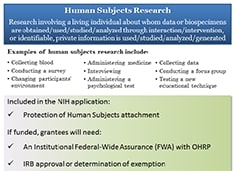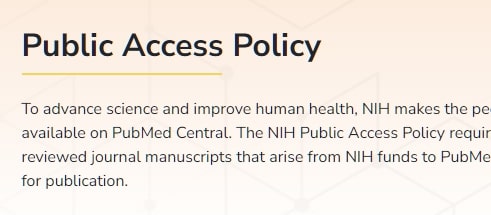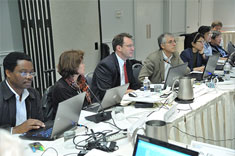The web pages below provide more in-depth information on specific policy topics, including context, resources, contacts and more.

Animal Welfare
The Office of Laboratory Animal Welfare ensures the humane care and use of animals in PHS-supported research, testing, and training by providing guidance and interpretation of the Public Health Service Policy on Humane Care and Use of Laboratory Animals, supporting educational programs, and monitoring compliance with the policy.

Animals in NIH Research
Learn about how animals are involved in NIH-supported research, their role in improving public health, efforts to strengthen rigor of the research, policies ensuring welfare of the animals, and when alternatives to animals are used.

Clinical Trial Requirements for Grants and Contracts
If you are submitting a grant application or responding to a contract proposal to NIH that includes a clinical trial, or are involved with conducting, managing, or overseeing clinical trials, learn about NIH policies, and find resources to guide you in your work.

Communicating and Acknowledging Federal Funding
Publicizing the outcomes of NIH-funded projects and communicating the role of NIH support in biomedical research improves public understanding of how we, the biomedical research community as a whole, are working to improve human health. This important information for researchers and public information officers (PIOs) describes how to correctly acknowledge NIH in your presentations, papers, posters, and press releases.

Early Stage Investigator Policies
NIH is committed to the continued support of early stage investigators; they bring fresh ideas and pioneer new areas of investigation. NIH has a number of policies and programs to encourage the support of these populations. Learn about these policies and whether you might qualify as an early stage investigator.

Family-Friendly Initiatives
Being able to balance work and family life is important for everyone, including biomedical and behavioral researchers. Learn more about some of the ways in which NIH helps our recipient institutions foster family-friendly environments for the NIH-supported workforce.

Financial Conflict of Interest
The NIH is committed to supporting research free from the bias of investigators' financial conflict of interest. Learn more about the Financial Conflict of Interest (FCOI) regulation, including reporting requirements, training, and resources.

Foreign Interference
NIH and the biomedical research enterprise have a long history of international collaborations with rules of engagement that allow science to advance while also protecting intellectual capital and proprietary information of the participating countries. These rules of engagement also are designed to limit bias in the design, conduct, and reporting of NIH-supported research. Learn more about actions that NIH, institutions, and researchers can take to protect U.S. biomedical intellectual innovation.

Human Subjects Research
Find useful information about proposing and conducting NIH extramural research involving human subjects, including policies, regulations, training and resources. Learn about considerations for human subjects research when planning and submitting a research application or contract proposal, and throughout the extramural funding cycle.

Inclusion Policies for Human Subjects
NIH is committed to supporting clinical research that benefits all individuals. The information provided on this website is designed to assist the extramural community in addressing inclusion of participants in research, including the Inclusion of Women and Minorities policy and the Inclusion Across the Lifespan policy, in NIH grant applications and progress reports.

Intellectual Property Policy
Inventions arising from federally funded research are required to be reported to the government agency that funded the project. Learn about the systems and policies related to intellectual property and invention reporting.

Lobbying Guidance for Recipient Activities
A general overview of lobbying restrictions on the work of NIH recipients, along with examples of restricted and permissible activities.

Natural Disasters
In emergency situations, the NIH's immediate concern is for the health and safety of people and animals in the programs we oversee. We are also deeply concerned about the health of the biomedical enterprise in the affected area, and we are committed to working with researchers and institutions to do all that we can to ensure that NIH-funded research continues.

Next Generation Researchers Initiative
NIH has launched the Next Generation Researchers Initiative to address longstanding challenges faced by researchers trying to embark upon and sustain independent research careers, and to take steps to promote the growth and stability of the biomedical research workforce.

NIH Fiscal Policies
Learn about the NIH budget process, grant funding strategies for each NIH Institute and Center, and more.

Peer Review Policies and Practices
Learn about the regulations and processes that govern peer review, including management of conflicts of interest, applicant and reviewer responsibilities in maintaining the integrity in peer review, appeals, and more.

Public Access
The NIH public access policy requires scientists to submit final peer-reviewed journal manuscripts that arise from NIH funds to PubMed Central immediately upon acceptance for publication. Learn how to address copyright issues, post manuscripts that have been accepted for publication to PubMed Central, and include the PMCID in citations in compliance with the policy.

Research Integrity
Learn about how NIH fosters integrity throughout the biomedical research process.

Research Misconduct
Learn about research integrity, responsible conduct of research, and research misconduct, including related policies and regulations, and what you can do to promote research integrity.

Rigor and Reproducibility
Key to the successful application of knowledge toward health outcomes is scientific rigor in conducting biomedical research. NIH promotes the highest level of scientific integrity, public accountability, and social responsibility in the conduct of science. This page assists the research community in addressing rigor and reproducibility in their grant applications.

Scientific Data Sharing: Policies and Access to Data
NIH expects recipients to make the results and accomplishments of their activities available to the research community and to the public at large. These pages highlight policies and guidance on sharing and accessing research resources developed with NIH funding.

Select Agent Information
This page provides the NIH awards process for research involving infectious agents and select agents, including submissions, awards, monitoring and oversight. This page also clarifies the processes and responsibilities for investigations of laboratory accidents, research-related illnesses and potential Biosafety violations.

Subawards
This page provides resources related to subawards. Please be sure to reference the NIH Grants Policy Statement (NIH GPS) and your specific notice of award for comprehensive requirements that apply to a specific award.

Submission Policies
Learn about the policies that may impact your application submission, including late applications, due dates on holidays/weekends, post submission application materials, continuous submission, guidelines for applicants experiencing system issues, resubmission policies, overlapping applications, weather and other disasters, and more.

Supporting a Safe and Respectful Workplace at Institutions that Receive NIH Funding
Learn about NIH's commitment to supporting a safe and respectful work environment, who to contact with questions or concerns, and what NIH's expectations are for institutions and the individuals supported on NIH-funded awards.